RocketMQ cluster architecture
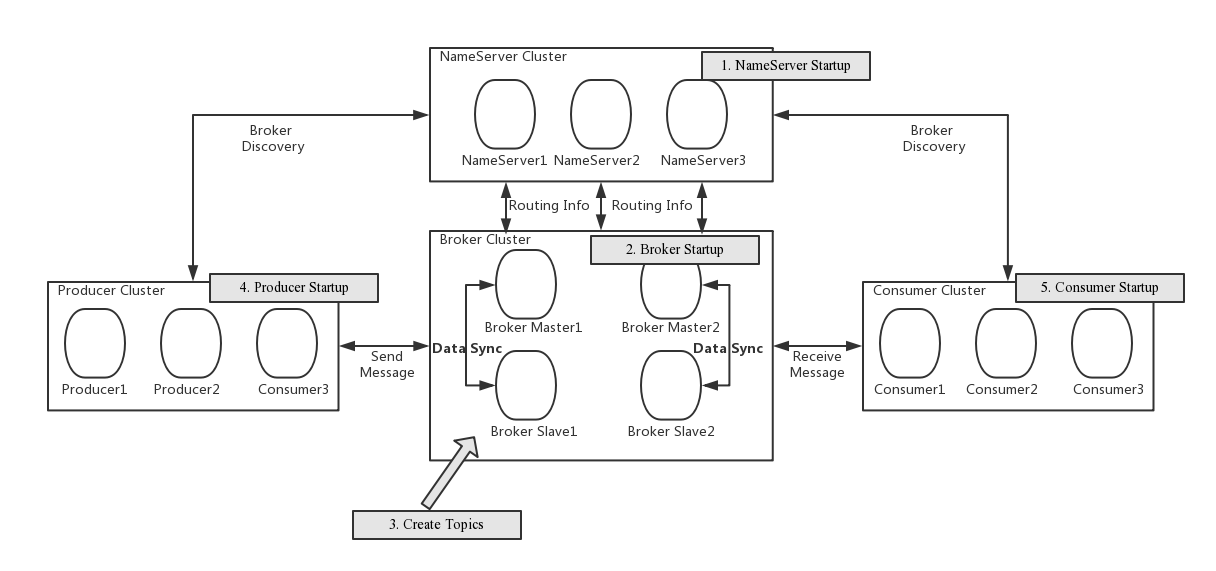
Roles in RocketMQ cluster
In a complete RocketMQ cluster, there are the following roles
- Producer: the sender of the message; Example: sender
- Consumer: message receiver; Example: recipient
- Broker: temporary storage and transmission of messages; Example: Post Office
- NameServer: manage Broker; Example: the management organization of each post office
- Topic: distinguish the types of messages; A sender can send messages to one or more topics; The recipient of a message can subscribe to one or more topic messages
- Message Queue: equivalent to the partition of Topic; Used to send and receive messages in parallel
RocketMQ native API usage
Using RocketMQ's native API development is the simplest and most reliable way at present. Here, we use SpringBoot to build a series of message producers and message consumers to access the RocketMQ cluster we built earlier.
Test environment construction
First, create a Maven based SpringBoot project and introduce the following dependencies:
<dependency>
<groupId>org.apache.rocketmq</groupId>
<artifactId>rocketmq-client</artifactId>
<version>4.7.1</version>
</dependency>
Both producers and consumers need to rely on NameServer to run. They only need to point the NameServer to our own RocketMQ cluster, and they can connect to our own RocketMQ cluster regardless of where the Broker is. RocketMQ provides two ways for producers and consumers to find NameServer:
- Specify the namesrvAddr attribute in your code. For example: consumer.setNamesrvAddr("127.0.0.1:9876");
- Via NAMESRV_ADDR environment variable. Multiple nameservers are connected by semicolons.
NAMESRV_ADDR=192.168.1.104:9876192.168.1.104:9876\;192.168.1.105:9876\;192.168.1.106:9876
Programming model of RocketMQ
RocketMQ's producer and consumer programming models have a relatively fixed step
- Fixed steps for message sender
1. Create a message producer and specify the producer group name
2. Specify Nameserver address
3. Start producer
4. Create a message object and specify the Topic, Tag and message body
5. Send message
6. Close the producer - Fixed steps for message consumers
1. Create a Consumer and make a Consumer group name
2. Specify Nameserver address
3. Subscribe to Topic and Tag
4. Set callback function to process messages
5. Start consumer
Example message for RocketMQ
Basic sample
Message producer
Message producers send messages in three ways. Unidirectional sending, synchronous sending and asynchronous sending.
The messenger use case remains unchanged, and the following three message sending methods are tested respectively
package org.apache.rocketmq.example.quickstart;
import org.apache.rocketmq.client.consumer.DefaultMQPushConsumer;
import org.apache.rocketmq.client.consumer.listener.ConsumeConcurrentlyContext;
import org.apache.rocketmq.client.consumer.listener.ConsumeConcurrentlyStatus;
import org.apache.rocketmq.client.consumer.listener.MessageListenerConcurrently;
import org.apache.rocketmq.client.exception.MQClientException;
import org.apache.rocketmq.common.consumer.ConsumeFromWhere;
import org.apache.rocketmq.common.message.MessageExt;
import java.util.List;
public class Consumer {
public static void main(String[] args) throws InterruptedException, MQClientException {
DefaultMQPushConsumer consumer = new DefaultMQPushConsumer("please_rename_unique_group_name_4");
consumer.setNamesrvAddr("192.168.1.104:9876");
consumer.setConsumeFromWhere(ConsumeFromWhere.CONSUME_FROM_LAST_OFFSET);
consumer.subscribe("TopicTest", "*");
consumer.registerMessageListener(new MessageListenerConcurrently() {
@Override
public ConsumeConcurrentlyStatus consumeMessage(List<MessageExt> msgs,
ConsumeConcurrentlyContext context) {
System.out.printf("%s Receive New Messages: %s %n", Thread.currentThread().getName(), msgs);
return ConsumeConcurrentlyStatus.CONSUME_SUCCESS;
}
});
consumer.start();
System.out.printf("Consumer Started.%n");
}
}
Unidirectional transmission
package org.apache.rocketmq.example.simple;
import org.apache.rocketmq.client.exception.MQClientException;
import org.apache.rocketmq.client.producer.DefaultMQProducer;
import org.apache.rocketmq.client.producer.SendResult;
import org.apache.rocketmq.common.message.Message;
import org.apache.rocketmq.remoting.common.RemotingHelper;
//Simple example: sending messages synchronously
public class Producer {
public static void main(String[] args) throws MQClientException, InterruptedException {
DefaultMQProducer producer = new DefaultMQProducer("ProducerGroupName");
// producer.setNamesrvAddr("192.168.1.104:9876");
producer.start();
for (int i = 0; i < 20; i++)
try {
{
Message msg = new Message("TopicTest",
"TagA",
"OrderID188",
"Hello world".getBytes(RemotingHelper.DEFAULT_CHARSET));
//Messages are delivered synchronously, and the messages are sent to a Broker node in the cluster.
// SendResult sendResult = producer.send(msg);
// System.out.printf("%s%n", sendResult);
producer.sendOneway(msg);
}
} catch (Exception e) {
e.printStackTrace();
}
producer.shutdown();
}
}


Synchronous transmission
package org.apache.rocketmq.example.simple;
import org.apache.rocketmq.client.exception.MQClientException;
import org.apache.rocketmq.client.producer.DefaultMQProducer;
import org.apache.rocketmq.client.producer.SendResult;
import org.apache.rocketmq.common.message.Message;
import org.apache.rocketmq.remoting.common.RemotingHelper;
//Simple example: sending messages synchronously
public class Producer {
public static void main(String[] args) throws MQClientException, InterruptedException {
DefaultMQProducer producer = new DefaultMQProducer("ProducerGroupName");
// producer.setNamesrvAddr("192.168.1.104:9876");
producer.start();
for (int i = 0; i < 20; i++)
try {
{
Message msg = new Message("TopicTest",
"TagA",
"OrderID188",
"Hello world".getBytes(RemotingHelper.DEFAULT_CHARSET));
//Messages are delivered synchronously, and the messages are sent to a Broker node in the cluster.
SendResult sendResult = producer.send(msg);
System.out.printf("%s%n", sendResult);
// producer.sendOneway(msg);
}
} catch (Exception e) {
e.printStackTrace();
}
producer.shutdown();
}
}


Asynchronous transmission
package org.apache.rocketmq.example.simple;
import org.apache.rocketmq.client.exception.MQClientException;
import org.apache.rocketmq.client.producer.DefaultMQProducer;
import org.apache.rocketmq.client.producer.SendCallback;
import org.apache.rocketmq.client.producer.SendResult;
import org.apache.rocketmq.common.message.Message;
import org.apache.rocketmq.remoting.common.RemotingHelper;
import java.io.UnsupportedEncodingException;
import java.util.concurrent.CountDownLatch;
import java.util.concurrent.TimeUnit;
//Simple example: sending messages asynchronously
public class AsyncProducer {
public static void main(
String[] args) throws MQClientException, InterruptedException, UnsupportedEncodingException {
DefaultMQProducer producer = new DefaultMQProducer("Jodie_Daily_test");
// producer.setNamesrvAddr("192.168.232.128:9876");
producer.start();
producer.setRetryTimesWhenSendAsyncFailed(0);
int messageCount = 100;
//Because it is sent asynchronously, a countDownLatch is introduced here to ensure that all the callback methods sent by the Producer are executed before stopping the Producer service.
final CountDownLatch countDownLatch = new CountDownLatch(messageCount);
for (int i = 0; i < messageCount; i++) {
try {
final int index = i;
Message msg = new Message("TopicTest",
"TagA",
"OrderID188",
"Hello world".getBytes(RemotingHelper.DEFAULT_CHARSET));
producer.send(msg, new SendCallback() {
@Override
public void onSuccess(SendResult sendResult) {
countDownLatch.countDown();
System.out.printf("%-10d OK %s %n", index, sendResult.getMsgId());
}
@Override
public void onException(Throwable e) {
countDownLatch.countDown();
System.out.printf("%-10d Exception %s %n", index, e);
e.printStackTrace();
}
});
System.out.println("Message sending completed");
} catch (Exception e) {
e.printStackTrace();
}
}
countDownLatch.await(5, TimeUnit.SECONDS);
producer.shutdown();
}
}
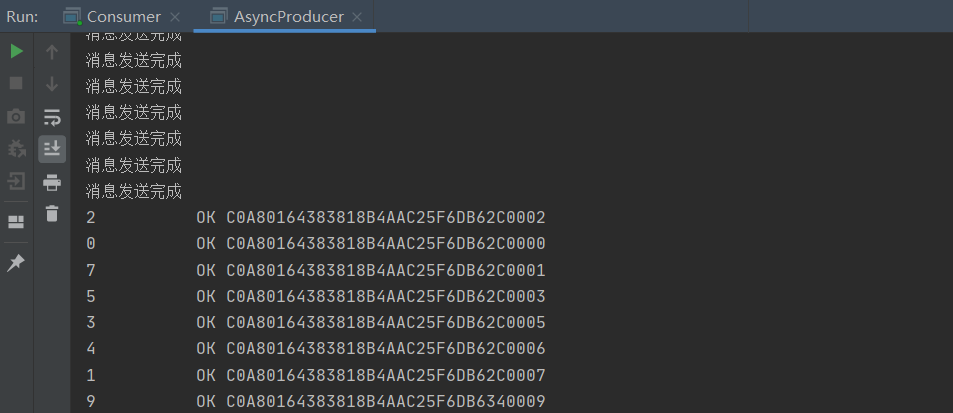
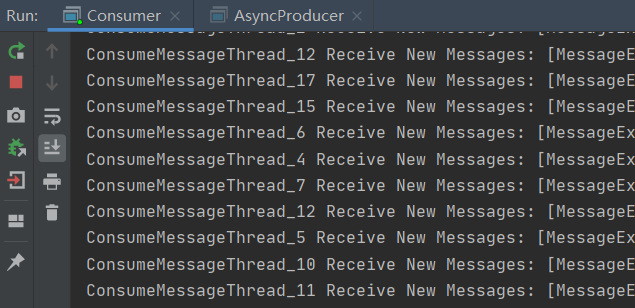
Message consumer
There are two modes for consumers to consume messages. One is that consumers take the initiative to pull messages from the Broker, and the other is that consumers wait for the Broker to push messages.
The producer use case remains unchanged, and the following two ways of consuming messages are tested respectively
Insert the code slice here
Push mode
package org.apache.rocketmq.example.simple;
import org.apache.rocketmq.client.consumer.DefaultMQPushConsumer;
import org.apache.rocketmq.client.consumer.listener.ConsumeConcurrentlyContext;
import org.apache.rocketmq.client.consumer.listener.ConsumeConcurrentlyStatus;
import org.apache.rocketmq.client.consumer.listener.MessageListenerConcurrently;
import org.apache.rocketmq.client.exception.MQClientException;
import org.apache.rocketmq.common.consumer.ConsumeFromWhere;
import org.apache.rocketmq.common.message.MessageExt;
import java.util.List;
public class PushConsumer {
public static void main(String[] args) throws InterruptedException, MQClientException {
DefaultMQPushConsumer consumer = new DefaultMQPushConsumer("CID_JODIE_1");
// consumer.setNamesrvAddr("192.168.232.128:9876");
consumer.subscribe("TopicTest", "*");
consumer.setConsumeFromWhere(ConsumeFromWhere.CONSUME_FROM_FIRST_OFFSET);
//wrong time format 2017_0422_221800
consumer.setConsumeTimestamp("20181109221800");
consumer.registerMessageListener(new MessageListenerConcurrently() {
@Override
public ConsumeConcurrentlyStatus consumeMessage(List<MessageExt> msgs, ConsumeConcurrentlyContext context) {
System.out.printf("%s Receive New Messages: %s %n", Thread.currentThread().getName(), msgs);
return ConsumeConcurrentlyStatus.CONSUME_SUCCESS;
}
});
consumer.start();
System.out.printf("Consumer Started.%n");
}
}
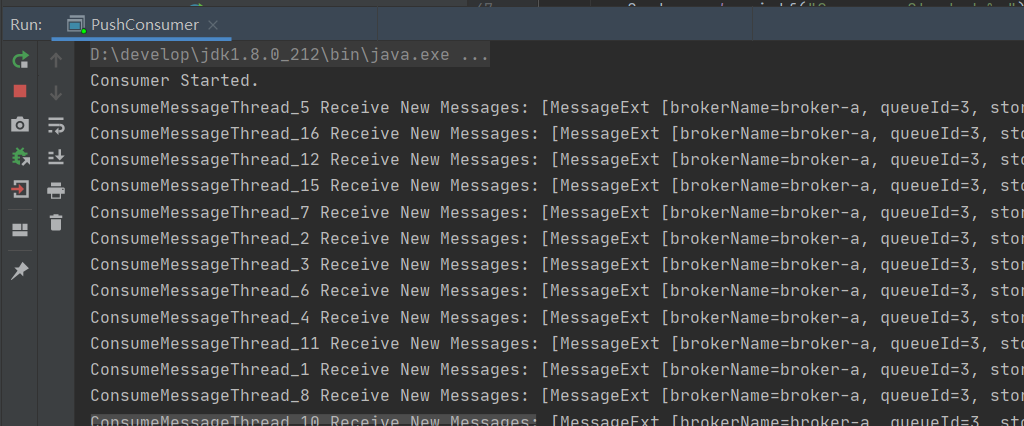
Pull mode
package org.apache.rocketmq.example.simple;
import org.apache.rocketmq.client.consumer.DefaultMQPullConsumer;
import org.apache.rocketmq.client.consumer.PullResult;
import org.apache.rocketmq.client.exception.MQClientException;
import org.apache.rocketmq.common.message.MessageQueue;
import java.util.HashMap;
import java.util.Map;
import java.util.Set;
public class PullConsumer {
private static final Map<MessageQueue, Long> OFFSE_TABLE = new HashMap<MessageQueue, Long>();
public static void main(String[] args) throws MQClientException {
DefaultMQPullConsumer consumer = new DefaultMQPullConsumer("please_rename_unique_group_name_5");
consumer.setNamesrvAddr("192.168.1.104:9876");
consumer.start();
Set<MessageQueue> mqs = consumer.fetchSubscribeMessageQueues("TopicTest");
for (MessageQueue mq : mqs) {
System.out.printf("Consume from the queue: %s%n", mq);
SINGLE_MQ:
while (true) {
try {
PullResult pullResult =
consumer.pullBlockIfNotFound(mq, null, getMessageQueueOffset(mq), 32);
System.out.printf("%s%n", pullResult);
putMessageQueueOffset(mq, pullResult.getNextBeginOffset());
switch (pullResult.getPullStatus()) {
case FOUND:
break;
case NO_MATCHED_MSG:
break;
case NO_NEW_MSG:
break SINGLE_MQ;
case OFFSET_ILLEGAL:
break;
default:
break;
}
} catch (Exception e) {
e.printStackTrace();
}
}
}
consumer.shutdown();
}
private static long getMessageQueueOffset(MessageQueue mq) {
Long offset = OFFSE_TABLE.get(mq);
if (offset != null)
return offset;
return 0;
}
private static void putMessageQueueOffset(MessageQueue mq, long offset) {
OFFSE_TABLE.put(mq, offset);
}
}

Generally, the push mode is relatively simple.
In fact, the push mode of RocketMQ is also encapsulated by the pull mode.
In version 4.7.1, the consumer class DefaultMQPullConsumerImpl has been marked as expired, but it can still be used. The replaced class is DefaultLitePullConsumerImpl.
package org.apache.rocketmq.example.simple;
import org.apache.rocketmq.client.consumer.DefaultLitePullConsumer;
import org.apache.rocketmq.common.consumer.ConsumeFromWhere;
import org.apache.rocketmq.common.message.MessageExt;
import java.util.List;
public class LitePullConsumerSubscribe {
public static volatile boolean running = true;
public static void main(String[] args) throws Exception {
DefaultLitePullConsumer litePullConsumer = new DefaultLitePullConsumer("lite_pull_consumer_test");
litePullConsumer.setConsumeFromWhere(ConsumeFromWhere.CONSUME_FROM_FIRST_OFFSET);
litePullConsumer.subscribe("TopicTest", "*");
litePullConsumer.start();
try {
while (running) {
List<MessageExt> messageExts = litePullConsumer.poll();
System.out.printf("%s%n", messageExts);
}
} finally {
litePullConsumer.shutdown();
}
}
}

package org.apache.rocketmq.example.simple;
import org.apache.rocketmq.client.consumer.DefaultLitePullConsumer;
import org.apache.rocketmq.common.message.MessageExt;
import org.apache.rocketmq.common.message.MessageQueue;
import java.util.ArrayList;
import java.util.Collection;
import java.util.List;
public class LitePullConsumerAssign {
public static volatile boolean running = true;
public static void main(String[] args) throws Exception {
DefaultLitePullConsumer litePullConsumer = new DefaultLitePullConsumer("please_rename_unique_group_name");
litePullConsumer.setAutoCommit(false);
litePullConsumer.start();
Collection<MessageQueue> mqSet = litePullConsumer.fetchMessageQueues("TopicTest");
List<MessageQueue> list = new ArrayList<>(mqSet);
List<MessageQueue> assignList = new ArrayList<>();
for (int i = 0; i < list.size() / 2; i++) {
assignList.add(list.get(i));
}
litePullConsumer.assign(assignList);
litePullConsumer.seek(assignList.get(0), 10);
try {
while (running) {
List<MessageExt> messageExts = litePullConsumer.poll();
System.out.printf("%s %n", messageExts);
litePullConsumer.commitSync();
}
} finally {
litePullConsumer.shutdown();
}
}
}

Sequential message
case
- producer
package org.apache.rocketmq.example.ordermessage;
import org.apache.rocketmq.client.exception.MQBrokerException;
import org.apache.rocketmq.client.exception.MQClientException;
import org.apache.rocketmq.client.producer.DefaultMQProducer;
import org.apache.rocketmq.client.producer.MQProducer;
import org.apache.rocketmq.client.producer.MessageQueueSelector;
import org.apache.rocketmq.client.producer.SendResult;
import org.apache.rocketmq.common.message.Message;
import org.apache.rocketmq.common.message.MessageQueue;
import org.apache.rocketmq.remoting.common.RemotingHelper;
import org.apache.rocketmq.remoting.exception.RemotingException;
import java.io.UnsupportedEncodingException;
import java.util.List;
public class Producer {
public static void main(String[] args) throws UnsupportedEncodingException {
try {
DefaultMQProducer producer = new DefaultMQProducer("please_rename_unique_group_name");
// producer.setNamesrvAddr("192.168.232.128:9876");
producer.start();
for (int i = 0; i < 10; i++) {
int orderId = i;
for(int j = 0 ; j <= 5 ; j ++){
Message msg =
new Message("OrderTopicTest", "order_"+orderId, "KEY" + orderId,
("order_"+orderId+" step " + j).getBytes(RemotingHelper.DEFAULT_CHARSET));
SendResult sendResult = producer.send(msg, new MessageQueueSelector() {
@Override
public MessageQueue select(List<MessageQueue> mqs, Message msg, Object arg) {
Integer id = (Integer) arg;
int index = id % mqs.size();
return mqs.get(index);
}
}, orderId);
System.out.printf("%s%n", sendResult);
}
}
producer.shutdown();
} catch (MQClientException | RemotingException | MQBrokerException | InterruptedException e) {
e.printStackTrace();
}
}
}
- consumer
package org.apache.rocketmq.example.ordermessage;
import org.apache.rocketmq.client.consumer.DefaultMQPushConsumer;
import org.apache.rocketmq.client.consumer.listener.*;
import org.apache.rocketmq.client.exception.MQClientException;
import org.apache.rocketmq.common.consumer.ConsumeFromWhere;
import org.apache.rocketmq.common.message.MessageExt;
import java.util.List;
import java.util.concurrent.TimeUnit;
import java.util.concurrent.atomic.AtomicLong;
public class Consumer {
public static void main(String[] args) throws MQClientException {
DefaultMQPushConsumer consumer = new DefaultMQPushConsumer("please_rename_unique_group_name_3");
consumer.setNamesrvAddr("192.168.1.104:9876");
consumer.setConsumeFromWhere(ConsumeFromWhere.CONSUME_FROM_LAST_OFFSET);
consumer.subscribe("OrderTopicTest", "*");
consumer.registerMessageListener(new MessageListenerOrderly() {
@Override
public ConsumeOrderlyStatus consumeMessage(List<MessageExt> msgs, ConsumeOrderlyContext context) {
context.setAutoCommit(true);
for(MessageExt msg:msgs){
System.out.println("Received message content "+new String(msg.getBody()));
}
return ConsumeOrderlyStatus.SUCCESS;
}
});
// This will not guarantee the order of final consumption.
// consumer.registerMessageListener(new MessageListenerConcurrently() {
// @Override
// public ConsumeConcurrentlyStatus consumeMessage(List<MessageExt> msgs, ConsumeConcurrentlyContext context) {
// for(MessageExt msg:msgs){
// System.out.println("received message content" + new String(msg.getBody()));
// }
// return ConsumeConcurrentlyStatus.CONSUME_SUCCESS;
// }
// });
consumer.start();
System.out.printf("Consumer Started.%n");
}
}
- Open two consumers

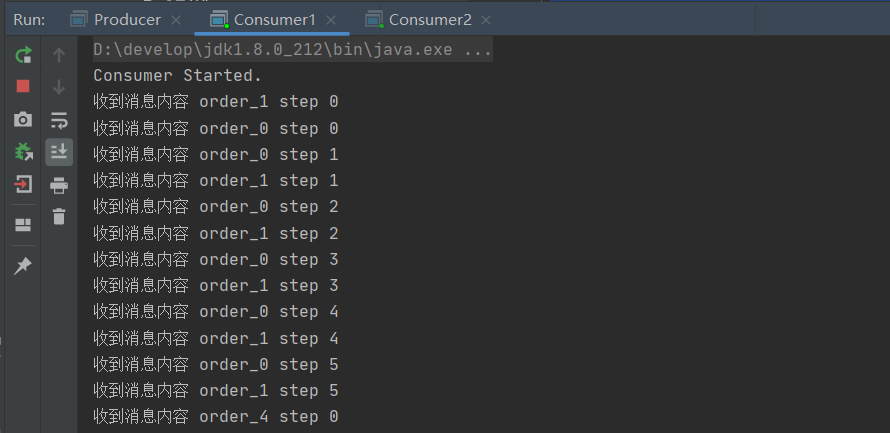
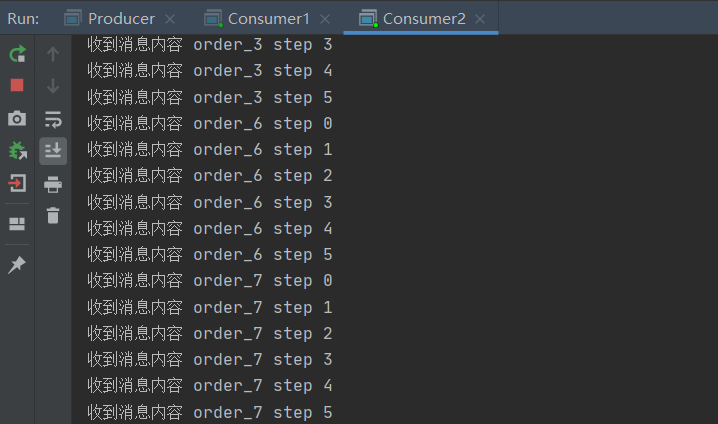
case analysis
RocketMQ guarantees the local order of messages, not the global order.
Looking back at our example, in fact, RocketMQ only ensures that all messages of each OrderID are in order (sent to the same queue), but not all messages are in order. Therefore, this involves the principle of RocketMQ message ordering. To ensure that the final consumed messages are orderly, you need to ensure that the messages are orderly in three steps: Producer, Broker and Consumer.
First, on the sender side: by default, the message sender will send messages to different messagequeues (partition queues) by Round Robin polling, and consumers will also pull messages from multiple messagequeues when consuming. In this case, the order of messages cannot be guaranteed. Only when a group of ordered messages are sent to the same MessageQueue can the first in first out feature of MessageQueue be used to ensure the order of this group of messages.
Messages in a queue in the Broker can be ordered.
Then on the consumer side: consumers will get messages from multiple Message queues. At this time, although the messages on each Message queue are orderly, the messages between multiple queues are still out of order. To ensure the order of messages, the consumer needs to get messages one by one, that is, after getting the messages of a queue, it can get the messages of the next queue. For the MessageListenerOrderly object injected into the consumer, RocketMQ will ensure that messages are retrieved one queue by one by locking the queue. Messagelistenercurrently, the Message listener does not lock the queue. Each time, it fetches a batch of data from multiple messages (no more than 32 by default). Therefore, the order of messages cannot be guaranteed.
Broadcast message
package org.apache.rocketmq.example.quickstart;
import org.apache.rocketmq.client.exception.MQClientException;
import org.apache.rocketmq.client.producer.DefaultMQProducer;
import org.apache.rocketmq.client.producer.SendResult;
import org.apache.rocketmq.common.message.Message;
import org.apache.rocketmq.remoting.common.RemotingHelper;
/**
* This class demonstrates how to send messages to brokers using provided {@link DefaultMQProducer}.
*/
public class Producer {
public static void main(String[] args) throws MQClientException, InterruptedException {
/*
* Instantiate with a producer group name.
*/
DefaultMQProducer producer = new DefaultMQProducer("please_rename_unique_group_name");
producer.setNamesrvAddr("192.168.1.104:9876");
/*
* Launch the instance.
*/
producer.start();
for (int i = 0; i < 2; i++) {
try {
/*
* Create a message instance, specifying topic, tag and message body.
*/
Message msg = new Message("TopicTest" /* Topic */,
"TagA" /* Tag */,
("Hello RocketMQ " + i).getBytes(RemotingHelper.DEFAULT_CHARSET) /* Message body */
);
//messageDelayLevel=1s 5s 10s 30s 1m 2m 3m 4m 5m 6m 7m 8m 9m 10m 20m 30m 1h 2h
// msg.setDelayTimeLevel(3);
/*
* Call send message to deliver message to one of brokers.
*/
SendResult sendResult = producer.send(msg);
System.out.printf("%s%n", sendResult);
} catch (Exception e) {
e.printStackTrace();
Thread.sleep(1000);
}
}
/*
* Shut down once the producer instance is not longer in use.
*/
producer.shutdown();
}
}
package org.apache.rocketmq.example.broadcast;
import org.apache.rocketmq.client.consumer.DefaultMQPushConsumer;
import org.apache.rocketmq.client.consumer.listener.ConsumeConcurrentlyContext;
import org.apache.rocketmq.client.consumer.listener.ConsumeConcurrentlyStatus;
import org.apache.rocketmq.client.consumer.listener.MessageListenerConcurrently;
import org.apache.rocketmq.client.exception.MQClientException;
import org.apache.rocketmq.common.consumer.ConsumeFromWhere;
import org.apache.rocketmq.common.message.MessageExt;
import org.apache.rocketmq.common.protocol.heartbeat.MessageModel;
import java.util.List;
public class PushConsumer {
public static void main(String[] args) throws InterruptedException, MQClientException {
DefaultMQPushConsumer consumer = new DefaultMQPushConsumer("please_rename_unique_group_name_1");
consumer.setConsumeFromWhere(ConsumeFromWhere.CONSUME_FROM_LAST_OFFSET);
consumer.setMessageModel(MessageModel.BROADCASTING);
consumer.subscribe("TopicTest", "*");
consumer.registerMessageListener(new MessageListenerConcurrently() {
@Override
public ConsumeConcurrentlyStatus consumeMessage(List<MessageExt> msgs,
ConsumeConcurrentlyContext context) {
System.out.printf("%s Receive New Messages: %s %n", Thread.currentThread().getName(), msgs);
return ConsumeConcurrentlyStatus.CONSUME_SUCCESS;
}
});
consumer.start();
System.out.printf("Broadcast Consumer Started.%n");
}
}

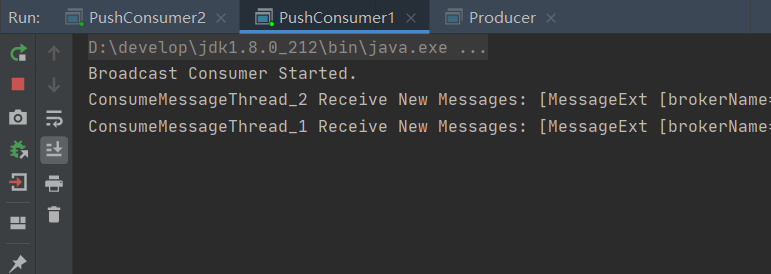

Delayed message
package org.apache.rocketmq.example.quickstart;
import org.apache.rocketmq.client.exception.MQClientException;
import org.apache.rocketmq.client.producer.DefaultMQProducer;
import org.apache.rocketmq.client.producer.SendResult;
import org.apache.rocketmq.common.message.Message;
import org.apache.rocketmq.remoting.common.RemotingHelper;
/**
* This class demonstrates how to send messages to brokers using provided {@link DefaultMQProducer}.
*/
public class Producer {
public static void main(String[] args) throws MQClientException, InterruptedException {
/*
* Instantiate with a producer group name.
*/
DefaultMQProducer producer = new DefaultMQProducer("please_rename_unique_group_name");
producer.setNamesrvAddr("192.168.1.104:9876");
/*
* Launch the instance.
*/
producer.start();
for (int i = 0; i < 2; i++) {
try {
/*
* Create a message instance, specifying topic, tag and message body.
*/
Message msg = new Message("TopicTest" /* Topic */,
"TagA" /* Tag */,
("Hello RocketMQ " + i).getBytes(RemotingHelper.DEFAULT_CHARSET) /* Message body */
);
//messageDelayLevel=1s 5s 10s 30s 1m 2m 3m 4m 5m 6m 7m 8m 9m 10m 20m 30m 1h 2h
msg.setDelayTimeLevel(3);
SendResult sendResult = producer.send(msg);
System.out.printf("%s%n", sendResult);
} catch (Exception e) {
e.printStackTrace();
Thread.sleep(1000);
}
}
/*
* Shut down once the producer instance is not longer in use.
*/
producer.shutdown();
}
}
package org.apache.rocketmq.example.quickstart;
import org.apache.rocketmq.client.consumer.DefaultMQPushConsumer;
import org.apache.rocketmq.client.consumer.listener.ConsumeConcurrentlyContext;
import org.apache.rocketmq.client.consumer.listener.ConsumeConcurrentlyStatus;
import org.apache.rocketmq.client.consumer.listener.MessageListenerConcurrently;
import org.apache.rocketmq.client.exception.MQClientException;
import org.apache.rocketmq.common.consumer.ConsumeFromWhere;
import org.apache.rocketmq.common.message.MessageExt;
import java.util.List;
public class Consumer {
public static void main(String[] args) throws InterruptedException, MQClientException {
/*
* Instantiate with specified consumer group name.
*/
DefaultMQPushConsumer consumer = new DefaultMQPushConsumer("please_rename_unique_group_name_4");
consumer.setNamesrvAddr("192.168.1.104:9876");
/*
* Specify where to start in case the specified consumer group is a brand new one.
*/
consumer.setConsumeFromWhere(ConsumeFromWhere.CONSUME_FROM_LAST_OFFSET);
/*
* Subscribe one more more topics to consume.
*/
consumer.subscribe("TopicTest", "*");
/*
* Register callback to execute on arrival of messages fetched from brokers.
*/
consumer.registerMessageListener(new MessageListenerConcurrently() {
@Override
public ConsumeConcurrentlyStatus consumeMessage(List<MessageExt> msgs,
ConsumeConcurrentlyContext context) {
System.out.printf("%s Receive New Messages: %s %n", Thread.currentThread().getName(), msgs);
return ConsumeConcurrentlyStatus.CONSUME_SUCCESS;
}
});
/*
* Launch the consumer instance.
*/
consumer.start();
System.out.printf("Consumer Started.%n");
}
}


The consumer will receive the message after a delay of 10s
The effect of delayed message implementation is that after calling the producer.send method, the message will not be sent immediately, but will be sent after a period of time. This is a unique feature of RocketMQ.
How long will it be delayed? Setting the delay time is to set a delay level message.setDelayTimeLevel(3) on the Message object;
In the open source version of RocketMQ, the delay setting at any time is not supported for delay messages (supported in the commercial version), but only 18 fixed delay levels are supported. 1 to 18 correspond to messagedelaylevel = 1s 5S 10s 30s 1m 2m 4m 7m 8m 9m 10m 20m 30m 1H 2H respectively. Where did you see that? In fact, it can be seen from the RocketMQ console. These 18 delay levels also support self-definition, but generally it is best not to customize and modify them.
Batch message
Batch message refers to combining multiple messages into one batch message and sending it at one time. This has the advantage of reducing network IO and improving throughput.
If the batch message is larger than 1MB, do not send it in one batch, but split it into multiple batches. That is, the size of a batch message should not exceed 1MB
In actual use, the 1MB limit can be slightly expanded. The actual maximum limit is 4194304 bytes, about 4MB. However, when using batch messages, this message length is indeed a problem that must be considered. Moreover, there are certain restrictions on the use of batch messages. These messages should have the same Topic and the same waitStoreMsgOK. And it cannot be delay message, transaction message, etc.
package org.apache.rocketmq.example.batch;
import org.apache.rocketmq.client.producer.DefaultMQProducer;
import org.apache.rocketmq.common.message.Message;
import java.util.ArrayList;
import java.util.List;
public class SimpleBatchProducer {
public static void main(String[] args) throws Exception {
DefaultMQProducer producer = new DefaultMQProducer("BatchProducerGroupName");
producer.start();
//If you just send messages of no more than 1MiB at a time, it is easy to use batch
//Messages of the same batch should have: same topic, same waitStoreMsgOK and no schedule support
String topic = "BatchTest";
List<Message> messages = new ArrayList<>();
messages.add(new Message(topic, "Tag", "OrderID001", "Hello world 0".getBytes()));
messages.add(new Message(topic, "Tag", "OrderID002", "Hello world 1".getBytes()));
messages.add(new Message(topic, "Tag", "OrderID003", "Hello world 2".getBytes()));
producer.send(messages);
producer.shutdown();
}
}
package org.apache.rocketmq.example.quickstart;
import org.apache.rocketmq.client.consumer.DefaultMQPushConsumer;
import org.apache.rocketmq.client.consumer.listener.ConsumeConcurrentlyContext;
import org.apache.rocketmq.client.consumer.listener.ConsumeConcurrentlyStatus;
import org.apache.rocketmq.client.consumer.listener.MessageListenerConcurrently;
import org.apache.rocketmq.client.exception.MQClientException;
import org.apache.rocketmq.common.consumer.ConsumeFromWhere;
import org.apache.rocketmq.common.message.MessageExt;
import java.util.List;
/**
* This example shows how to subscribe and consume messages using providing {@link DefaultMQPushConsumer}.
*/
public class Consumer {
public static void main(String[] args) throws InterruptedException, MQClientException {
/*
* Instantiate with specified consumer group name.
*/
DefaultMQPushConsumer consumer = new DefaultMQPushConsumer("please_rename_unique_group_name_4");
consumer.setNamesrvAddr("192.168.1.104:9876");
consumer.setConsumeFromWhere(ConsumeFromWhere.CONSUME_FROM_LAST_OFFSET);
/*
* Subscribe one more more topics to consume.
*/
consumer.subscribe("BatchTest", "*");
/*
* Register callback to execute on arrival of messages fetched from brokers.
*/
consumer.registerMessageListener(new MessageListenerConcurrently() {
@Override
public ConsumeConcurrentlyStatus consumeMessage(List<MessageExt> msgs,
ConsumeConcurrentlyContext context) {
System.out.printf("%s Receive New Messages: %s %n", Thread.currentThread().getName(), msgs);
return ConsumeConcurrentlyStatus.CONSUME_SUCCESS;
}
});
/*
* Launch the consumer instance.
*/
consumer.start();
System.out.printf("Consumer Started.%n");
}
}

If the batch sending message exceeds the limit size, it needs to be split
package org.apache.rocketmq.example.batch;
import org.apache.rocketmq.client.producer.DefaultMQProducer;
import org.apache.rocketmq.common.message.Message;
import java.util.ArrayList;
import java.util.Iterator;
import java.util.List;
import java.util.Map;
public class SplitBatchProducer {
public static void main(String[] args) throws Exception {
DefaultMQProducer producer = new DefaultMQProducer("BatchProducerGroupName");
producer.start();
//large batch
String topic = "BatchTest";
List<Message> messages = new ArrayList<>(100 * 1000);
for (int i = 0; i < 100 * 1000; i++) {
messages.add(new Message(topic, "Tag", "OrderID" + i, ("Hello world " + i).getBytes()));
}
// producer.send(messages);
//split the large batch into small ones:
ListSplitter splitter = new ListSplitter(messages);
while (splitter.hasNext()) {
List<Message> listItem = splitter.next();
producer.send(listItem);
}
producer.shutdown();
}
}
class ListSplitter implements Iterator<List<Message>> {
private int sizeLimit = 1000 * 1000;
private final List<Message> messages;
private int currIndex;
public ListSplitter(List<Message> messages) {
this.messages = messages;
}
@Override
public boolean hasNext() {
return currIndex < messages.size();
}
@Override
public List<Message> next() {
int nextIndex = currIndex;
int totalSize = 0;
for (; nextIndex < messages.size(); nextIndex++) {
Message message = messages.get(nextIndex);
int tmpSize = message.getTopic().length() + message.getBody().length;
Map<String, String> properties = message.getProperties();
for (Map.Entry<String, String> entry : properties.entrySet()) {
tmpSize += entry.getKey().length() + entry.getValue().length();
}
tmpSize = tmpSize + 20; //for log overhead
if (tmpSize > sizeLimit) {
//it is unexpected that single message exceeds the sizeLimit
//here just let it go, otherwise it will block the splitting process
if (nextIndex - currIndex == 0) {
//if the next sublist has no element, add this one and then break, otherwise just break
nextIndex++;
}
break;
}
if (tmpSize + totalSize > sizeLimit) {
break;
} else {
totalSize += tmpSize;
}
}
List<Message> subList = messages.subList(currIndex, nextIndex);
currIndex = nextIndex;
return subList;
}
@Override
public void remove() {
throw new UnsupportedOperationException("Not allowed to remove");
}
}
Filter messages
In most cases, you can use the Tag attribute of Message to filter information simply and quickly.
Mainly to see the news consumers. consumer.subscribe(“TagFilterTest”, “TagA || TagC”); This sentence only subscribes to taga and TAGC messages.
TAG is a unique message attribute in RocketMQ. In the best practice of RocketMQ, it is suggested that when using RocketMQ, an application can use one Topic, and different businesses in the application can be distinguished by TAG.
package org.apache.rocketmq.example.filter;
import org.apache.rocketmq.client.producer.DefaultMQProducer;
import org.apache.rocketmq.client.producer.SendResult;
import org.apache.rocketmq.common.message.Message;
import org.apache.rocketmq.remoting.common.RemotingHelper;
public class TagFilterProducer {
public static void main(String[] args) throws Exception {
DefaultMQProducer producer = new DefaultMQProducer("please_rename_unique_group_name");
producer.setNamesrvAddr("192.168.1.104:9876");
producer.start();
String[] tags = new String[] {"TagA", "TagB", "TagC"};
for (int i = 0; i < 15; i++) {
Message msg = new Message("TagFilterTest",
tags[i % tags.length],
"Hello world".getBytes(RemotingHelper.DEFAULT_CHARSET));
SendResult sendResult = producer.send(msg);
System.out.printf("%s%n", sendResult);
}
producer.shutdown();
}
}
package org.apache.rocketmq.example.filter;
import org.apache.rocketmq.client.consumer.DefaultMQPushConsumer;
import org.apache.rocketmq.client.consumer.listener.ConsumeConcurrentlyContext;
import org.apache.rocketmq.client.consumer.listener.ConsumeConcurrentlyStatus;
import org.apache.rocketmq.client.consumer.listener.MessageListenerConcurrently;
import org.apache.rocketmq.client.exception.MQClientException;
import org.apache.rocketmq.common.message.MessageExt;
import java.io.IOException;
import java.util.List;
public class TagFilterConsumer {
public static void main(String[] args) throws InterruptedException, MQClientException, IOException {
DefaultMQPushConsumer consumer = new DefaultMQPushConsumer("please_rename_unique_group_name");
consumer.setNamesrvAddr("192.168.1.104:9876");
consumer.subscribe("TagFilterTest", "TagA || TagC");
consumer.registerMessageListener(new MessageListenerConcurrently() {
@Override
public ConsumeConcurrentlyStatus consumeMessage(List<MessageExt> msgs,
ConsumeConcurrentlyContext context) {
System.out.printf("%s Receive New Messages: %s %n", Thread.currentThread().getName(), msgs);
return ConsumeConcurrentlyStatus.CONSUME_SUCCESS;
}
});
consumer.start();
System.out.printf("Consumer Started.%n");
}
}


However, this method has a great limitation, that is, a message can only have one TAG, which is a little insufficient in some complex scenarios. At this time, you can use SQL expressions to filter messages.
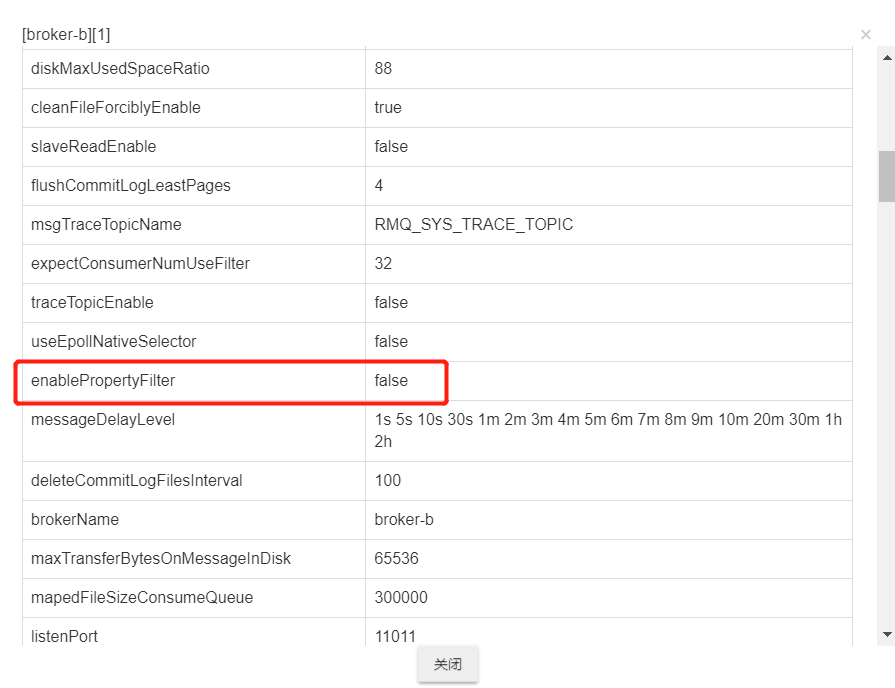
package org.apache.rocketmq.example.filter;
import org.apache.rocketmq.client.producer.DefaultMQProducer;
import org.apache.rocketmq.client.producer.SendResult;
import org.apache.rocketmq.common.message.Message;
import org.apache.rocketmq.remoting.common.RemotingHelper;
public class SqlFilterProducer {
public static void main(String[] args) throws Exception {
DefaultMQProducer producer = new DefaultMQProducer("please_rename_unique_group_name");
producer.start();
String[] tags = new String[] {"TagA", "TagB", "TagC"};
for (int i = 0; i < 15; i++) {
Message msg = new Message("SqlFilterTest",
tags[i % tags.length],
("Hello RocketMQ " + i).getBytes(RemotingHelper.DEFAULT_CHARSET)
);
msg.putUserProperty("a", String.valueOf(i));
SendResult sendResult = producer.send(msg);
System.out.printf("%s%n", sendResult);
}
producer.shutdown();
}
}
package org.apache.rocketmq.example.filter;
import org.apache.rocketmq.client.consumer.DefaultMQPushConsumer;
import org.apache.rocketmq.client.consumer.MessageSelector;
import org.apache.rocketmq.client.consumer.listener.ConsumeConcurrentlyContext;
import org.apache.rocketmq.client.consumer.listener.ConsumeConcurrentlyStatus;
import org.apache.rocketmq.client.consumer.listener.MessageListenerConcurrently;
import org.apache.rocketmq.common.message.MessageExt;
import java.util.List;
public class SqlFilterConsumer {
public static void main(String[] args) throws Exception {
DefaultMQPushConsumer consumer = new DefaultMQPushConsumer("please_rename_unique_group_name");
// Don't forget to set enablePropertyFilter=true in broker
consumer.subscribe("SqlFilterTest",
MessageSelector.bySql("(TAGS is not null and TAGS in ('TagA', 'TagB'))" +
"and (a is not null and a between 0 and 3)"));
consumer.registerMessageListener(new MessageListenerConcurrently() {
@Override
public ConsumeConcurrentlyStatus consumeMessage(List<MessageExt> msgs,
ConsumeConcurrentlyContext context) {
System.out.printf("%s Receive New Messages: %s %n", Thread.currentThread().getName(), msgs);
return ConsumeConcurrentlyStatus.CONSUME_SUCCESS;
}
});
consumer.start();
System.out.printf("Consumer Started.%n");
}
}
The key to this pattern is to use a MessageSelector returned by MessageSelector.bySql(String sql) on the consumer side. The sql statements are executed according to the SQL92 standard. The parameters that can be used in sql include the default TAGS and an a attribute added to the producer.
SQL92 syntax:
RocketMQ only defines some basic syntax to support this feature. You can also easily expand it.
Numerical comparison, such as: >, > =, <, < =, BETWEEN, =;
Character comparison, such as: =, < >, IN;
IS NULL or IS NOT NULL;
Logical symbols AND, OR, NOT;
Constant support types are:
Value, such as 123, 3.1415;
Characters, such as' abc ', must be enclosed in single quotation marks;
NULL, special constant
Boolean, TRUE or FALSE
Note: only consumers in push mode can use SQL filtering. Pull mode is useless.
Transaction message
First, let's understand what transaction messages are. The introduction of the official website is: transaction message is a two-stage submitted message implementation to ensure final consistency in distributed systems. It can ensure the atomicity of local transaction execution and message sending, that is, the two operations succeed or fail together.
Secondly, let's understand the programming model of transaction messages. The transaction message only guarantees the atomicity of the two operations of the message sender's local transaction and message sending. Therefore, the example of transaction message only involves the message sender, and there is nothing special for the message consumer.
The key to transaction messages is to specify a TransactionListener transaction listener in TransactionMQProducer, which is the key controller of transaction messages. The case in the source code is a little complex. I have prepared a clearer example of transaction listener here
package org.apache.rocketmq.example.transaction;
import org.apache.rocketmq.client.exception.MQClientException;
import org.apache.rocketmq.client.producer.SendResult;
import org.apache.rocketmq.client.producer.TransactionListener;
import org.apache.rocketmq.client.producer.TransactionMQProducer;
import org.apache.rocketmq.common.message.Message;
import org.apache.rocketmq.remoting.common.RemotingHelper;
import java.io.UnsupportedEncodingException;
import java.util.concurrent.*;
public class TransactionProducer {
public static void main(String[] args) throws MQClientException, InterruptedException {
TransactionListener transactionListener = new TransactionListenerImpl();
TransactionMQProducer producer = new TransactionMQProducer("please_rename_unique_group_name");
producer.setNamesrvAddr("192.168.1.104:9876");
ExecutorService executorService = new ThreadPoolExecutor(2, 5, 100, TimeUnit.SECONDS, new ArrayBlockingQueue<Runnable>(2000), new ThreadFactory() {
@Override
public Thread newThread(Runnable r) {
Thread thread = new Thread(r);
thread.setName("client-transaction-msg-check-thread");
return thread;
}
});
producer.setExecutorService(executorService);
producer.setTransactionListener(transactionListener);
producer.start();
String[] tags = new String[] {"TagA", "TagB", "TagC", "TagD", "TagE"};
for (int i = 0; i < 10; i++) {
try {
Message msg =
new Message("TopicTest", tags[i % tags.length], "KEY" + i,
("Hello RocketMQ " + i).getBytes(RemotingHelper.DEFAULT_CHARSET));
SendResult sendResult = producer.sendMessageInTransaction(msg, null);
System.out.printf("%s%n", sendResult);
Thread.sleep(10);
} catch (MQClientException | UnsupportedEncodingException e) {
e.printStackTrace();
}
}
for (int i = 0; i < 100000; i++) {
Thread.sleep(1000);
}
producer.shutdown();
}
}
package org.apache.rocketmq.example.transaction;
import org.apache.commons.lang3.StringUtils;
import org.apache.rocketmq.client.producer.LocalTransactionState;
import org.apache.rocketmq.client.producer.TransactionListener;
import org.apache.rocketmq.common.message.Message;
import org.apache.rocketmq.common.message.MessageExt;
import java.util.concurrent.ConcurrentHashMap;
import java.util.concurrent.atomic.AtomicInteger;
public class TransactionListenerImpl implements TransactionListener {
private AtomicInteger transactionIndex = new AtomicInteger(0);
private ConcurrentHashMap<String, Integer> localTrans = new ConcurrentHashMap<>();
@Override
public LocalTransactionState executeLocalTransaction(Message msg, Object arg) {
// int value = transactionIndex.getAndIncrement();
// int status = value % 3;
// localTrans.put(msg.getTransactionId(), status);
// return LocalTransactionState.UNKNOW;
//Execute after submitting the transaction message.
//Return to commit_ Messages with message status will be consumed by consumers immediately.
//Return to rollback_ Messages with message status are discarded.
//For the message that returns the UNKNOWN status, the Broker will check the status of the transaction again after a period of time.
String tags = msg.getTags();
if(StringUtils.contains(tags,"TagA")){
//TagA messages will be consumed by consumers immediately
return LocalTransactionState.COMMIT_MESSAGE;
}else if(StringUtils.contains(tags,"TagB")){
//TagB messages are discarded
return LocalTransactionState.ROLLBACK_MESSAGE;
}else{
//Other messages will wait for the Broker to check the transaction status.
return LocalTransactionState.UNKNOW;
}
}
//It is executed when the status check is performed on the UNKNOWN status message. The results returned are the same.
@Override
public LocalTransactionState checkLocalTransaction(MessageExt msg) {
// Integer status = localTrans.get(msg.getTransactionId());
// if (null != status) {
// switch (status) {
// case 0:
// return LocalTransactionState.UNKNOW;
// case 1:
// return LocalTransactionState.COMMIT_MESSAGE;
// case 2:
// return LocalTransactionState.ROLLBACK_MESSAGE;
// default:
// return LocalTransactionState.COMMIT_MESSAGE;
// }
// }
// return LocalTransactionState.COMMIT_MESSAGE;
String tags = msg.getTags();
//TagC messages will be consumed by consumers over time
if(StringUtils.contains(tags,"TagC")){
return LocalTransactionState.COMMIT_MESSAGE;
}else if(StringUtils.contains(tags,"TagD")){
//TagD messages will also be discarded during status lookback
return LocalTransactionState.ROLLBACK_MESSAGE;
}else{
//The remaining tag messages will be discarded after multiple status lookbacks
return LocalTransactionState.UNKNOW;
}
}
}
package org.apache.rocketmq.example.quickstart;
import org.apache.rocketmq.client.consumer.DefaultMQPushConsumer;
import org.apache.rocketmq.client.consumer.listener.ConsumeConcurrentlyContext;
import org.apache.rocketmq.client.consumer.listener.ConsumeConcurrentlyStatus;
import org.apache.rocketmq.client.consumer.listener.MessageListenerConcurrently;
import org.apache.rocketmq.client.exception.MQClientException;
import org.apache.rocketmq.common.consumer.ConsumeFromWhere;
import org.apache.rocketmq.common.message.MessageExt;
import java.util.List;
public class Consumer {
public static void main(String[] args) throws InterruptedException, MQClientException {
DefaultMQPushConsumer consumer = new DefaultMQPushConsumer("please_rename_unique_group_name_4");
consumer.setNamesrvAddr("192.168.1.104:9876");
consumer.setConsumeFromWhere(ConsumeFromWhere.CONSUME_FROM_LAST_OFFSET);
consumer.subscribe("TopicTest", "*");
consumer.registerMessageListener(new MessageListenerConcurrently() {
@Override
public ConsumeConcurrentlyStatus consumeMessage(List<MessageExt> msgs,
ConsumeConcurrentlyContext context) {
System.out.printf("%s Receive New Messages: %s %n", Thread.currentThread().getName(), msgs);
return ConsumeConcurrentlyStatus.CONSUME_SUCCESS;
}
});
consumer.start();
System.out.printf("Consumer Started.%n");
}
}
Then, we want to understand the usage restrictions of the following transaction messages:
- 1. Transaction messages do not support delayed messages and batch messages.
- 2. In order to avoid the accumulation of semi queue messages caused by too many checks on a single message, we limit the number of checks on a single message to 15 by default, but users can modify this limit through the transactionCheckMax parameter of the Broker configuration file. If a message has been checked more than N times (N = transactionCheckMax), the Broker will discard the message and print the error log at the same time by default. Users can modify this behavior by overriding the AbstractTransactionCheckListener class.
The number of backchecks is configured by the parameter BrokerConfig.transactionCheckMax. It is 15 by default and can be overwritten in broker.conf. Then, the actual number of checks will save a user attribute messageconst.property in message_ TRANSACTION_ CHECK_ TIMES. If the value of this attribute is greater than transactionCheckMax, it will be discarded. The value of this user attribute will be incremented by the number of lookbacks. You can also override this attribute in Producer.
- 3. The transaction message will be checked after a specific length of time such as the parameter transactionMsgTimeout in the Broker configuration file. When sending a transaction message, the user can also set the user attribute CHECK_IMMUNITY_TIME_IN_SECONDS to change this limit. This parameter takes precedence over the transactionMsgTimeout parameter.
Configured by the parameter BrokerConfig.transactionTimeOut. The default is 6 seconds, which can be modified in broker.conf. In addition, you can configure a messageconst.property for the message_ CHECK_ IMMUNITY_ TIME_ IN_ The seconds property to specify a specific message callback time for the message. msg.putUserProperty(MessageConst.PROPERTY_CHECK_IMMUNITY_TIME_IN_SECONDS, “10000”); That's 10 seconds.
- 4. Transactional messages may be checked or consumed more than once.
- 5. The target topic message submitted to the user may fail. At present, this depends on the log records. Its high availability is guaranteed by RocketMQ's own high availability mechanism. If you want to ensure that transaction messages are not lost and transaction integrity is guaranteed, it is recommended to use synchronous dual write mechanism.
- 6. The producer ID of transaction messages cannot be shared with the producer ID of other types of messages. Unlike other types of messages, transaction messages allow reverse queries, and MQ servers can query consumers through their producer ID.
Next, we also need to understand the implementation mechanism of the following transaction message, as shown in the figure below:
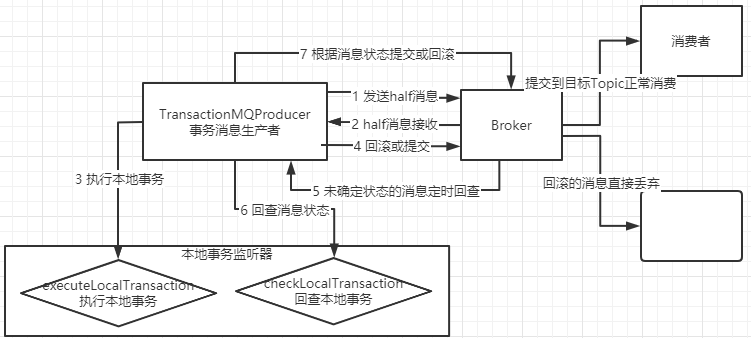
The key of the transaction message mechanism is that when sending a message, it will be converted into a half message and stored in an RMQ inside RocketMQ_ SYS_ TRANS_ HALF_ Topic is a topic that is invisible to consumers. After passing a series of transaction checks, the message is transferred to the target topic, which is visible to consumers.
Finally, we need to think about the role of transaction messages.
Let's think about the relationship between this transaction message and distributed transactions? Why does it involve two-phase commit related to distributed transactions? The transaction message only guarantees the atomicity of the sender's local transaction and the sending message, but does not guarantee the atomicity of the consumer's local transaction. Therefore, the transaction message only guarantees half of the distributed transaction. However, even so, for complex distributed transactions, the transaction message provided by RocketMQ is also the best degradation scheme in the industry.